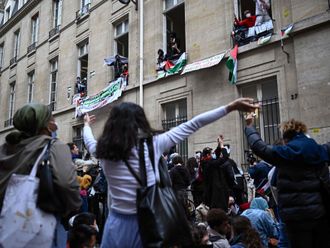Cairo: On November 9, 1977, then Egyptian president Anwar Sadat, four years after his army took on Israel in a surprise attack, stunned almost everyone when he declared readiness to go anywhere in the world, even Occupied Jerusalem, for peace.
"I am ready to go to the Knesset (Israeli parliament) itself and discuss it with them," he said in his landmark speech.
The stunned audience, including the leader of the Palestine Liberation Organisation Yasser Arafat, who was in the Egyptian parliament at the time, interpreted Sadat's offer as a mere rhetorical declaration.
Eleven days later, Sadat, who ruled Egypt from 1970 to 1981, went to Occupied Jerusalem on the invitation of the Israeli government on a historic trip, the first by an Arab leader to Israel since its creation in 1948.
The visit, known as Sadat's peace initiative, implied Egypt's recognition of Israel after four wars between them. Egypt, which was widely seen as the champion of Arab nationalism under Jamal Abdul Nasser (Sadat's predecessor), saw a major shift with Sadat's trip to Occupied Jerusalem.
While clearing the way for direct peace negotiations brokered by the US first in Cairo in December 1977, Sadat's trip drew massive criticism both in Egypt and the Arab world.
Arab countries such as Libya, Syria and Iraq called Sadat a traitor and convened an emergency conference in Baghdad, where it was decided to suspend Egypt's membership in the Arab League, which continued until 1989.
Most Arab countries boycotted Egypt, accusing it of not putting enough pressure on Israel to solve the Palestinian problem, the Arabs' most protracted and important cause until now. In October 1981, Sadat was assassinated by militants in Cairo, partly due to his peace agreement with Israel.
Egyptian-Israeli talks at the US Camp David resort resulted in the Camp David Accords signed by Sadat and Israeli Prime Minister Menachem Begin on September 17, 1978, at the White House as US president Jimmy Carter looked on. The accords culminated in the two countries sealing a peace treaty in March 1979, the first by an Arab country with Israel.
Under the deal, Israel agreed to withdraw its troops from Sinai that it occupied in 1967, and evacuate 4,500 Jewish colonists in return for normal relations with Egypt, guarantees of freedom of passage through the Suez Canal and other nearby waterways, and a restriction on the forces Egypt could place in Sinai, especially within 20-40 km from Israel.
Israel also agreed to limit its forces three kilometres from the Egyptian border, and to guarantee free passage between Egypt and Jordan.












